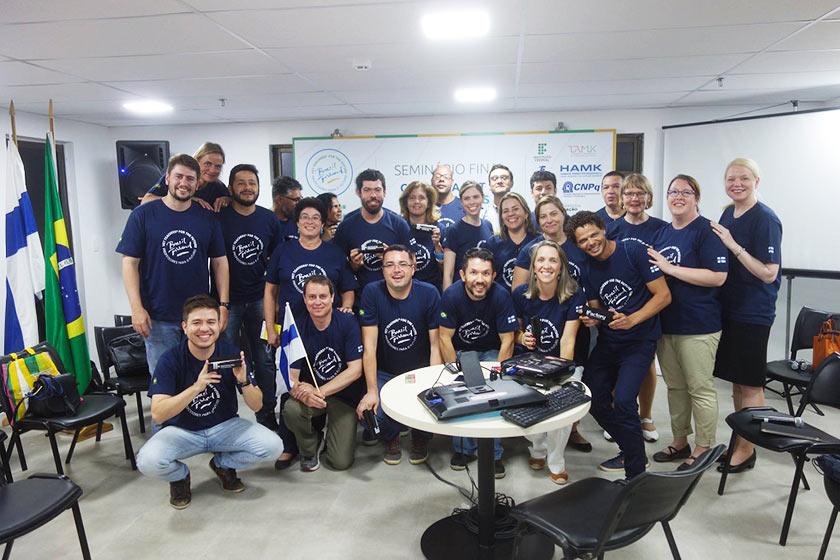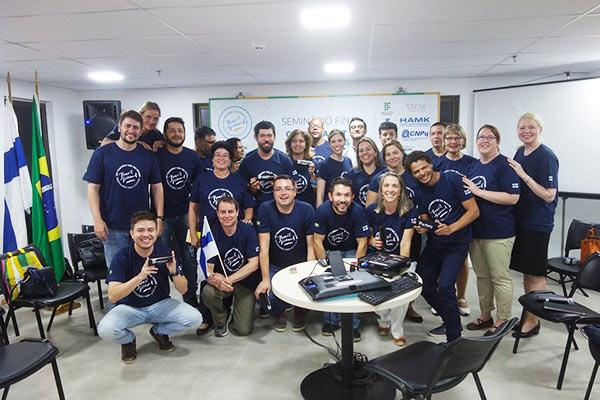
Authors: Essi Ryymin, Irma Kunnari and Alexandre Fonseca D’Andréa
Teacher education programme for Brazilian teachers
Häme University of Applied Sciences (HAMK) has coordinated The VET Teachers for the Future – Professional Development Programme for Brazilian teachers since 2014 together with its partner Tampere University of Applied Sciences (TAMK). The programme has been implemented altogether three times now. One training lasts about 7-9 months including study sections both in Finnish and in Brazilian learning environments. The programme scores 30 credits.
Altogether 106 teachers have graduated from the programme so far, and thousands of students and teacher colleagues have been contributed to regional development work in Brazil. The participants of the programme represent several disciplines and sciences, for example biotechnology, agricultural engineering, agronomy, computer science, chemistry, mathematics, linguistics, educational sciences and business administration. The teachers’ work in the Federal Institutes in Brazil, which are institutions for higher, basic and professional education specialized in offering vocational and technology education. The goal of the Federal Institutes is to answer to social and economic demands of the region by using applied research to boost innovations and the local development.
The goal in The VET Teachers for the Future programme is to encourage the participants to collaboratively rethink and design innovative education and learning environments to respond to their on-going regional and future challenges. The main contents of the program include competency-based education with 21st century skills and cooperation between universities and the world of work. The teacher students create and implement an individual or a shared development project during the training. The projects include a wide spectrum of inventions from the scientific research to high tech and social innovations, for example new digital applications and games for education, school management models, new pedagogical practices and training programmes as well as pedagogical models for preventing social exclusion.
Making professional development transparent by digital solutions
In the programme digital solutions were consciously utilized in order to make teachers’ professional development visible, especially issues related to relatedness, social connections and networked expertise. For example, teachers were encouraged to solve educational challenges together and share, and further develop, their thinking collaboratively and openly on different digital platforms. Hakkarainen and his team (2004) have developed a theoretical and methodological framework to examine networked expertise; higher-level competences that arise, in appropriate environments, from sustained collaborative efforts to solving problems and building knowledge together.
Many theorists have defined relatedness as a basic human need that is essential for wellbeing (Baumeister & Leary 1995; Deci Ryan 2012), and others have suggested that having stable, satisfying relationships is a general resilience factor across the lifespan (Mikulincer 1998). The role of positive emotions in the formation of social bonds (Baumeister & Leary 1995) and in the creation of important skills and resources (Fredrickson 2001; Sheldon King 2001) has been widely noticed.
Creating wellbeing for members of the community can be understood as a learning process that enhances relatedness, competence and autonomy (Ryan & Deci 2000; Sheldon & King 2001; Hakkarainen, Palonen, Paavola & Lehtinen 2004; Seligman & Csikszentmihalyi 2000). These basic psychological needs are determinative with regard to optimal experience and wellbeing in daily life, also in an educational environment. Creating wellbeing within a teacher education programme can be seen then as an active, collaborative and situated process in which the relationship between individuals and their environment is constantly constructed and modified (Soini, Pyhältö & Pietarinen 2010).
The first study results reveals creative use of digital solutions
There in an ongoing study in which Finnish and Brazilian programme partners try to capture optimal practices of teachers’ professional development, in terms of building relatedness, feeling of competence, autonomy and networked expertise. A key question is also how the digital solutions can be used in wellbeing and networked expertise building?
During the training programme the group of teacher students from Brazil were personally interviewed. Also the data from the use of different digital platform and database was gathered, e.g. from learning diaries (blogs), discussion forums and competence demonstrations from interactive applications. The transcripts and the digital data is qualitatively analyzed. The content analysis (Krippendorff 2004) aimed to define the teachers in professional development practices by using case analysis of each participant’s descriptions of key events promoting professional development during the education programme (Patton 1990, 376-377).
The first study results (Kunnari & Ryymin 2016; Ryymin, Kunnari, Joyce & Laurikainen 2016; Ryymin et al. 2015) reveal that practices such as building, caring and respecting connections, creating positive interpretations and affordances together, adopting practices according to the perceived needs of the teachers have an impact on relationships that fostered senses of relatedness, competence and autonomy of teacher students. These relationships appeared to play an important role in creating successful social conditions for learning, wellbeing and pedagogical change. This can be seen as an interpersonal flourishing, which is a core feature of quality living across cultures.
The preliminary findings suggest also that the teachers consciously constructed networked expertise and socio-psychological wellbeing by applying digital solutions creatively, and this had a positive impact on their pedagogical practices. Creative, flexible and open use of digital solutions enhanced wellbeing for example by multiplying emotional, societal and cognitive support and by making peer support, positive feedback, reciprocal respect as well as cultural knowhow, knowledge, sensitivity and understanding transparent and accessible. The networked expertise was evolved, e.g. by sharing connections and resources, consulting colleagues and linking people and by solving relevant regional challenges together. The digital solutions seemed to facilitate the process effectively. The programme, as well as the applied research process, is ongoing, iterative and dynamic by its nature, and more detailed findings and conclusions will be reflected and dialogued later in the process. It is also very important to analyze what the challenges and obstacles in teachers’ professional development and pedagogical change are, as well as what are the qualities for successful international teacher education in the future.

Authors
Essi Ryymin, Ph.D., Research and Development Manager, Principal Lecturer, Häme University of Applied Sciences, essi.ryymin(at)hamk.fi
Irma Kunnari, M.Ed., Principal Lecturer, Ph.D. Student, Häme University of Applied Sciences, irma.kunnari(at)hamk.fi
Alexandre Fonseca D’Andréa, Ph.D., Teacher of Basic, Technical and Technological Education, Federal Institute of Education, Science and Technology of Paraíba,
alexdandrea(at)gmail.com
[vc_tta_accordion active_section=”0″ no_fill=”true” el_class=”lahteet”][vc_tta_section title=”References” tab_id=”1458134585005-b3f22396-5506″]
Baumeister, R. F., & Leary, M. R. 1995. The Need to Belong: Desire for Interpersonal Attachments as a Fundamental Human Motivation. Psychological Bulletin, 117(3), 497-529.
Deci, E. L., & Ryan, R. M. 2012. Motivation, personality, and development within embedded social contexts: An overview of self-determination theory. In R. M. Ryan (Ed.), Oxford handbook of human motivation (pp. 85-107). Oxford, UK: Oxford University Press.
Fredrickson, BL. 2001. The Role of Positive Emotions in Positive Psychology: The Broaden-and-Build Theory of Positive Emotions. The American psychologist. 2001;56(3): 218-226.
Hakkarainen, K., Palonen, T., Paavola, S. & Lehtinen, E. 2004. Communities of networked expertise: Professional and educational perspectives. Advances in Learning and Instruction Series. Amsterdam: Elsevier.
Krippendorff, K. 2004. Content Analysis: An Introduction to Its Methodology (2nd ed.). Thousand Oaks, CA: Sage
Kunnari, I. & Ryymin, E. 2016. Successful Teacher Development in the Digital Era – The Role of Wellbeing and Networked Expertise. Paper presented in EAPRIL (The European Association for Practitioner Research on Improving Learning) Conference, 3.-25.11.2016, Porto.
Mikulincer, M. 1998. Attachment working models and the sense of trust: An exploration of interaction goals and affect regulation. Journal of Personality and Social Psychology, 74, 1209-1224.
Patton, M.Q. 1990. Qualitative evaluation and research methods (2nd ed.). Newbury Park, CA.
Ryan, R.M. & Deci, E.L. 2001. On Happiness and Human Potential: A Review of Research on Hedonic and Eudaimonic Well-Being. Annual Review of Psychology, 52, 141-166.
Ryymin, E., Kunnari, I., Joyce, B. & Laurikainen, M. 2016. Networked Expertise Empowering Brazilian Teachers’ Professional Development and Pedagogical Change. International Journal for Cross-Diciplinary subjects in Education, 7(2), 2755-2760. DOI: 10.20533/ijcdse.2042.6364.2016.0375
Ryymin, E., Corado, C., Joyce, B., Kokkomäki, J., Kunnari, I., Laurikainen, M., Lianda, R & Viskari, M. 2015. Finnish-Brazilian Learning Process as an Experimental Path towards Pedagogical Change. Paper presented in NOLAN, The 8th Nordic Latin American Research Network Conference, 11.-13.6.2015, Helsinki.
Seligman, M.E.P., & Csikszentmihalyi M. 2000. Positive Psychology. An Introduction. American Psychologist, 55 (1), 5-14.
Sheldon, K.M., & King, L.A. 2001. Why positive psychology is necessary. American Psychologist, 56, 216-217.
Soini, T., Pyhältö, K. & Pietarinen, J. 2010. Pedagogical well-being: Reflecting learning and well-being in teachers’ work. Teaching and teachers: theory and practice, 16, 735–751.
[/vc_tta_section][/vc_tta_accordion]



